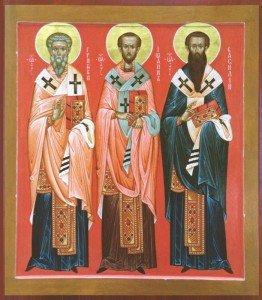 St. Basil writes that the function of the Holy Spirit is not to reveal Himself, but to reveal the Son “through whom all things were made” and who is also personally known in His humanity as Jesus Christ. He also writes that “it is impossible to give a precise definition of the person or hypostasis of the Holy Spirit and we must simply resist errors concerning Him which come from various sides.” The personal existence of the Holy Spirit thus remains a mystery. It is an existence whose fulfillment consists in manifesting the kingship of the Logos (Word) in creation and in salvation history.
St. Basil writes that the function of the Holy Spirit is not to reveal Himself, but to reveal the Son “through whom all things were made” and who is also personally known in His humanity as Jesus Christ. He also writes that “it is impossible to give a precise definition of the person or hypostasis of the Holy Spirit and we must simply resist errors concerning Him which come from various sides.” The personal existence of the Holy Spirit thus remains a mystery. It is an existence whose fulfillment consists in manifesting the kingship of the Logos (Word) in creation and in salvation history.
For the Cappadocian Fathers, the Trinitarian interpretation of all the acts of God implies the participation of the Spirit in the act of creation. When Genesis mentions “the Spirit of God moving upon the face of the waters”, patristic tradition interprets the passage in the sense of a primeval maintenance of all things by the Spirit, which made possible the subsequent appearance of a created logical order through the Word of God. Absolutely no chronological sequence is implied here, of course; and the action of the Spirit is part of the continuous creative action of God in the world. “The principle of all things is one,” writes Basil, “which creates through the Son and perfects in the Spirit.”
This is, of course, can be a very difficult thing for us to understand. What Basil is attempting to say is that God, as Trinity, calls all things into existence. The Father has the intention to create, the Son truly expresses the intention to create specific things and the Spirit actualizes that which is intended.
Basil identifies this function of perfecting or actualizing creation as sanctification, and implies that not only man, but nature as a whole, is perfectly itself only when it is in communion with God and when it is filled with the Spirit. The secular is always imperfect, or rather it exists only as a fallen and defective state of creation. This is particularly true of man, whose nature consists precisely in his being theocentric. Man received this theocentricity, which the Greek Fathers always understood as a real participation in the life of God, when he was created and when God breathed into his nostrils the breath of life. This breath of God’s life, identified with the Holy Spirit on the basis of the Septuagint version, is what made man to be God’s image.”
Our Greek-based Christianity stresses that we share in God’s own life.
